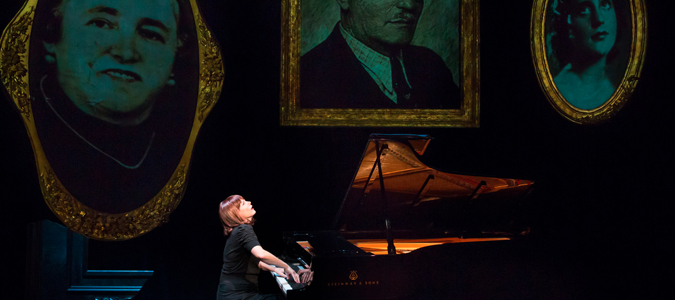

The Pianist of Willesden Lane
Opening Night: July 22, 2014
Closing: August 12, 2014
Theater: 59E59 Theaters
Set in Vienna in 1938 and in London during the Blitz, The Pianist of Willesden Lane tells the true story of Lisa Jura, a young Jewish pianist who is dreaming about her concert debut at Vienna’s storied Musikverein concert hall. But with the issuing of new ordinances under the Nazi regime, everything for Lisa changes, except for her love of music and the pursuit of her dream. Featuring some of the world’s most beloved piano music played live, The Pianist of Willesden Lane is performer Mona Golabek’s true family story; a story of music, family survival, and hope.
BUY TICKETSREAD THE REVIEWS:
July 15, 2014
Nine months before the outbreak of World War II, the United Kingdom took in nearly 10,000 children from Germany, Austria, Czechoslovakia, Poland and the Free City of Danzig, and placed them in foster homes, hostels, schools and farms. This rescue mission is known as the Kindertransport. One of these rescued children was the 14-year-old Lisa Jura, a musical prodigy whose story was recounted by her daughter, Mona Golabek, and Lee Cohen in the book The Children of Willesden Lane: Beyond the Kindertransport: A Memoir of Music, Love, and Survival. The book was published in 2002. Ten years later, Hershey Felder adapted it into a one-woman show, The Pianist of Willesden Lane. The show premiered at the Geffen Playhouse in Los Angeles directed by Felder and featuring Golabek as her mother and garnered some favorable reviews. It’s and is now at 59E59 Theaters. In many ways Golabek is an obvious choice for the role of Lisa Jura. Besides being intimately involved with the story, she is an accomplished pianist in her own right, having been taught mostly by her mother. She has appeared in concert with major orchestras and conductors around the world, has won awards and hosts a classical music radio program, The Romantic Hours. The problem is she is not an actress. As a result, the story of Jura’s flight from Vienna, her arrival in the United Kingdom, the Blitz and her eventual acceptance into The Royal Academy of Music remains more narration than drama. While archival pictures are projected onto elaborate picture frames, Golabek tries to bring the story to life by playing the various characters in her mother’s story: her parents, her friends, the different people who sheltered her. However, none of these characters are ever given any distinguishing personality. Even Jura is fairly generic.
READ THE REVIEWJuly 23, 2014
I think I have just seen the highlight of the 2014-2015 theatre season. I can’t imagine I will be as touched by any show between now and May as I was by The Pianist of Willesden Lane, which opened last night at 59E59 Theaters. For most of the hour and 45 intermissionless-minutes I was unaware of even being in a theatre, so immersed was I in the story and the music and the performer who brought them to life. I was transported to Nazi-occupied Vienna and war-ravaged London, experiencing that world with a cast of characters who were as real to me as if I had known them. Mona Golabek is not an actor, but she doesn’t need to be. Her passion for her story is nothing that could be learned. It has been lived by her family, most especially her mother, concert pianist Lisa Jura. Adapted and directed by Hershey Felder, based on the book The Children of Willesden Lane: Beyond the Kindertransport: A Memoir of Music, Love, and Survival by Mona Golabek and Lee Cohen, this one-woman play begins in 1938 Vienna where 14-year-old Lisa lives for her Friday afternoon piano lesson with her master teacher. She has inherited her love for music from her mother, also a pianist. I admire Golabek for sharing their story. Solo plays are always hard, but I can’t imagine what it must be like to portray so much trauma from her family’s history, night after night. Wisely, she steers clear of heightened emotions, avoiding expression of anger, judgment or sentimentality. The story holds all the emotion one needs and she serves it well by her straightforward, gentle telling.
READ THE REVIEWJuly 18, 2014
Accompanying herself with the theatricality of classical piano pieces, Mona Golabek’s one-woman memoir tells the arresting story of 14-year-old piano prodigy, Lisa Jura. In 1938, Lisa is forced to leave the security of her family in Vienna as Nazi occupation and anti-Jewish laws loom dangerously close. An accomplished pianist, Golabek’s The Pianist of Willesden Lane, adapted and directed by Hershey Felder, is a gripping story and glorious musicianship that holds the packed 59E59 Theater audience riveted for 90 minutes. Lisa Jura was Mona Golabek’s mother. The play is adapted from the 2002 book, The Children of Willesden Lane: Beyond the Kindertransport: A Memoir of Music, Love, and Survival (written by Golabek with Lee Cohen). Staging by Trevor Hay and Hershey Felder sets an elegant mood with large gold frames against a black backdrop, displaying photos and paintings relating to the plot. In the center, on a gold rimmed dais, is a Steinway concert grand piano, gleaming under a spotlight. In front of the piano, Golabek, wearing a red wig, tells Lisa’s tale and then sits at the keyboard to perform selections that highlight the flow of emotions — the theatricality of Rachmaninoff, a meditative Beethoven’s “Moonlight” Sonata, and of course, Grieg. These elevate the story with beauty and emotion.
READ THE REVIEWJuly 22, 2014
Some stories deserve to be told over and over again. Lisa Jura’s is one of them. Jura was a classically trained pianist who escaped Nazi Austria at the age of 14. Her daughter, Mona Golabek (also a concert pianist), preserved her mother’s story in the 2003 memoir The Children of Willesden Lane. Actor/pianist Hershey Felder has now adapted that story into a one-woman show starring Golabek, The Pianist of Willesden Lane, which is making its New York debut at 59E59 Theaters. It’s a captivating story of sacrifice, love, and war, set to the dramatic music that carried Lisa through the most destructive war in human history. Lisa Jura is the daughter of a Jewish tailor in Vienna in the 1920s, a time when café society and classical music reigned supreme. A talented young pianist, Lisa dreams of joining this world by making her concert debut at the Vienna Musikverein. Yet as she reaches her 14th birthday, this urbane world takes on a distinct cruelty. Because she is Jewish, Lisa is no longer allowed to take piano lessons. Her father loses his business, leading him to turn to gambling. One day, he wins one ticket on the Kindertransport, a program to relocate Jewish children to the relative safety of England. While he has three daughters, he can only choose one. He chooses Lisa.
READ THE REVIEWJuly 23, 2014
Playing your mom onstage would be a challenge for even a seasoned actress. Playing your mom at 14? Yikes! So it’s all the more remarkable that Mona Golabek, who is undertaking this feat in The Pianist of Willesden Lane, seems to slip so effortlessly into the persona of her mother, the pianist Lisa Jura, during her tumultuous adolescence in Vienna and London. For Ms. Golabek is not a trained actress, but a concert pianist herself. In this deeply affecting memoir-once-removed, adapted and directed by Hershey Felder, and based on a book by Ms. Golabek and Lee Cohen, Ms. Golabek tells the story of her mother’s youth during World War II in her mother’s voice. Underpinning the story are selections from the classical piano repertoire — Bach and Beethoven, Chopin and Rachmaninoff — which Ms. Golabek performs on the Steinway grand piano that gleams on a gilt-edged platform at center stage and is her sole co-star. After introducing herself, Ms. Golabek glides to the piano and plays a few bars from the Grieg Piano Concerto, as the sound of a recorded orchestra swells behind her. “My name is Lisa Jura, and I’m 14 years old,” she says, her voice taking on a girlish lilt and a slight accent. “It’s Vienna, 1938, and it’s a Friday afternoon. I’m preparing for the most important hour of my week — my piano lesson.” But this week the lesson will not take place. After Lisa makes it past the German soldier with the rifle at the front door, her beloved instructor tells her he has been forbidden to teach Jewish students. “I’m not a brave man,” he says, and bids her goodbye.
READ THE REVIEW




















